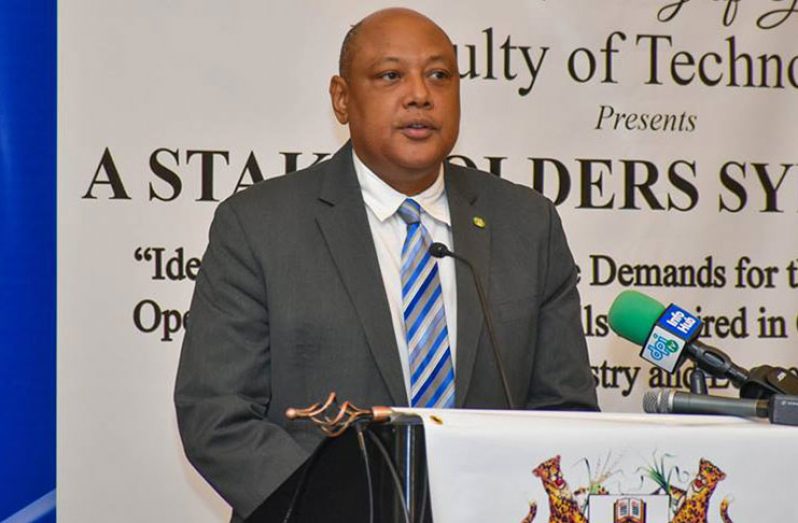– Trotman urges skill enhancement in other sectors
POLICIES needed to facilitate a thriving oil and gas industry are being drafted, strengthened and updated by the Government of Guyana, through its Ministry of Natural Resources. Minister with the portfolio, Raphael Trotman on Friday detailed some of the preparatory work being undertaken by the government which he said has been looking at many examples worldwide and have even adapted many good lessons in its preparations for ‘First Oil’ and beyond.

He was speaking at the first-ever stakeholders’ oil and gas symposium organised by the University of Guyana, Faculty of Technology, at the Marriott Hotel in Georgetown which sought to broaden the perspective of the university’s faculty, students and other institutions in embracing the new opportunities that will become available in the country’s petroleum sector. Speaking of current efforts, Trotman called attention to the present Petroleum Act which is being revised and which has been making rapid progress towards public engagement and consultations within the first quarter of 2018.
“This is the main piece of legislation which details the conduct of activities and their regulation within the sector. This Act will be supported by a series of detailed regulations, the first series of which will speak to the technical, health, safety and environmental requirements,” the minister explained.
He said the Petroleum Commission of Guyana Bill is aimed at establishing an agency responsible for the regulation of the sector, ensuring that activities are carried out in conformity with policies, legislation and regulations. “This Bill which is currently before a Special Select Committee, continues to go through a series of national consultations to ensure that we create an agency which is relevant, capable and equipped to carry out this critical function.” The Sovereign Wealth Fund Bill is also in draft form and under review, Trotman pointed out, and this process is being led by the Ministry of Finance.

The Petroleum Taxation and other fiscal legislation are also in the process of review and development and are also led by the Finance Ministry. At the level of Cabinet, a Sub-Committee for the Petroleum Sector has been formed comprising Trotman, the Ministers of State, Finance, Infrastructure, Business and the Presidential Advisor on Petroleum. At the level of the ministries, there is also a Petroleum Sector Ministerial Committee comprising the Ministers of State, Natural Resources, Finance, Infrastructure and Business.
“Within the Ministry of Natural Resource we have been consistently expanding our internal capacity through the engagement of expert advisors and establishing a Petroleum Department, and supporting the key governance initiatives such as the recently formed Guyana Extractive Industries Transparency Initiative (GYEITI), through which, Guyana recently became the 53rd candidate country of the international institution – the Extractive Industries Transparency Initiative (EITI),” Trotman informed.
In 2018, he said this work will continue and focus will be intensified on the establishment of a national oil company, with responsibility for Guyana’s commercial interest in the sector; a scientific institute to support cutting edge regulation and the development of the sector. An offshore logistics base which will serve to not only support the operations of the oil operators and bring much needed revenue to Guyana, but also to support the development of other local industries.
ENHANCE SKILLS
Minister Trotman urged the stakeholders to think about enhancing the skills that are transferrable to other sectors when the oil and gas industry gets into full swing. “Relative to the large capital employed, the industry does not employ many persons directly. However, the industry generates revenues that can be made available to expand development and provide jobs in other sectors of the economy,” Trotman said at the stakeholders’ oil and gas symposium.
Fabrication, for instance, can be utilised in mining and shipbuilding, the minister noted, while IT and telecommunications could be applicable across a wide range of sectors as can welders, chefs, mechanics, logistics, marketing and business administrators. “I also encourage you to make the most of the experienced members of the diaspora, visiting professionals and resident operating and service companies, to provide input in curriculum development.
Partner with professional associations such as the AAPG and the Society of Petroleum Engineers to benefit from guest lectures, since many of these associations have regional offices,” Trotman urged.





.jpg)








